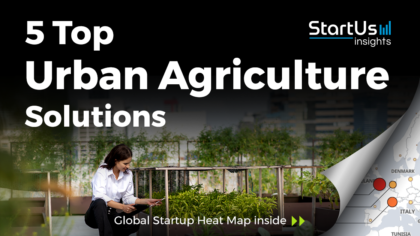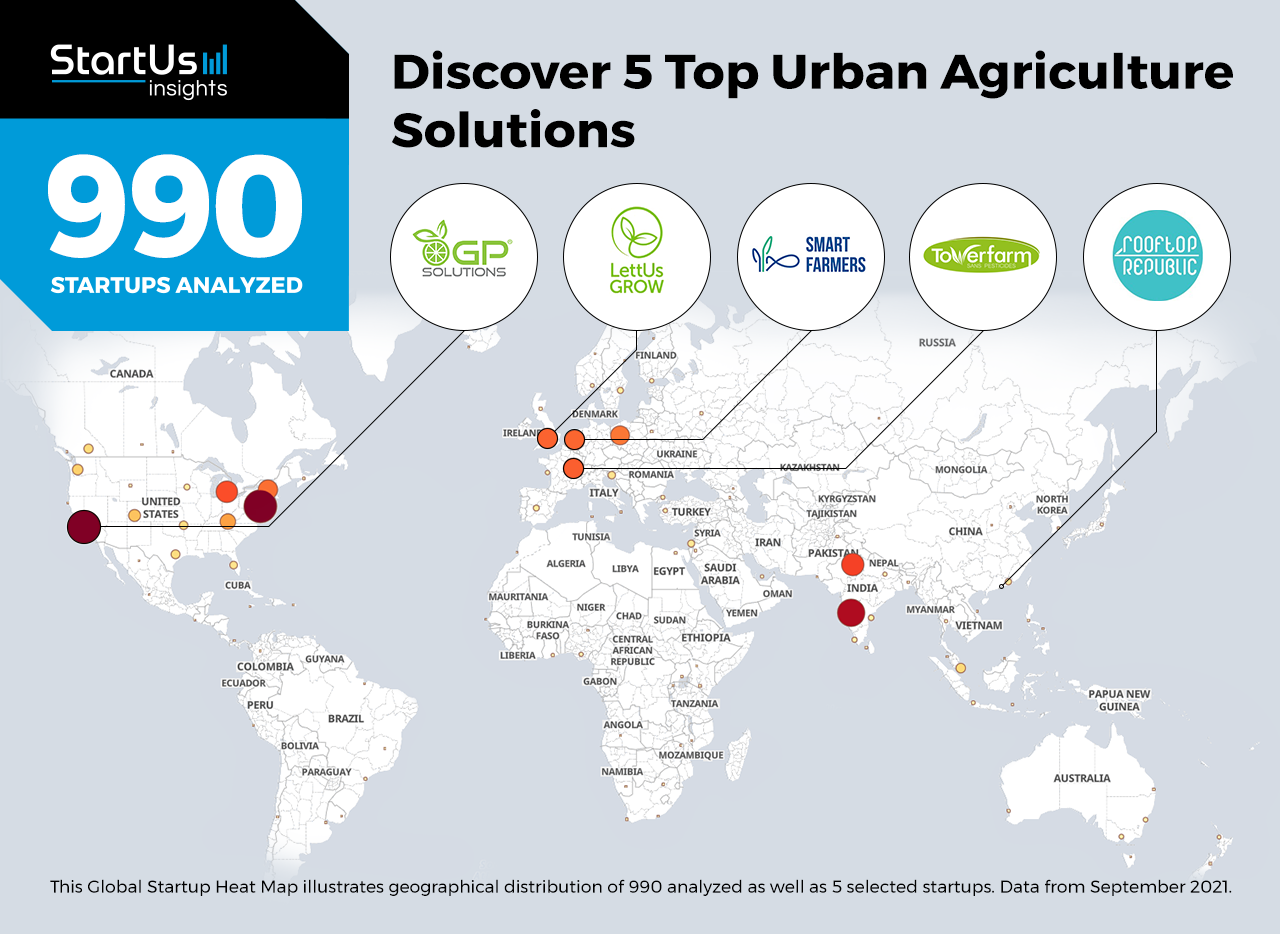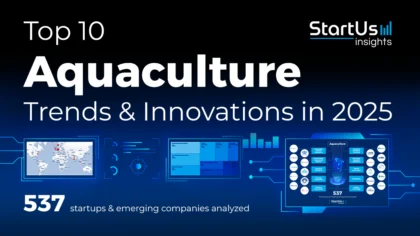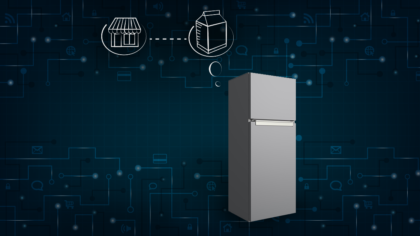Accelerate Productivity in 2025
Reignite Growth Despite the Global Slowdown
Staying ahead of the technology curve means strengthening your competitive advantage. That is why we give you data-driven innovation insights into the agriculture industry. This time, you get to discover 5 hand-picked urban agriculture solutions.
Out of 990, the Global Startup Heat Map highlights 5 Top Urban Agriculture Solutions
The insights of this data-driven analysis are derived from the Big Data & Artificial Intelligence-powered StartUs Insights Discovery Platform, covering 2 093 000+ startups & scaleups globally. The platform gives you an exhaustive overview of emerging technologies & relevant startups within a specific field in just a few clicks.
The Global Startup Heat Map below reveals the distribution of the 990 exemplary startups & scaleups we analyzed for this research. Further, it highlights 5 AgriTech startups that we hand-picked based on criteria such as founding year, location, funding raised, and more. You get to explore the solutions of these 5 startups & scaleups in this report. For insights on the other 985 urban agriculture solutions, get in touch.
Tower Farm enables Vertical Indoor Farming
The food urban people eat travel miles before it reaches their plate as agriculture is usually practiced in rural areas. Therefore, to cut the cost of transportation and reduce carbon footprint, startups are offering urban farming solutions. This involves growing plants in artificially controlled environments where most of the operations are automated. This saves costs on utilities and labor as well as lowers the carbon footprint.
French startup Tower Farm provides indoor vertical farming to enable the cultivation of edible and medicinal plants. Its product, Growin consists of four vertical rotating towers with 1200 to 1800 growing holes. Each tower completes a rotation in 24 hours, mimicking a day’s natural cycle. LED lamps recreate the sun’s light spectrum at each phase of the day, while dark areas allow the plants to rest. Additionally, its digital management system platform remotely controls the cultivation process.
Growpod creates a Farm-in-a-Box
In urban agriculture, the controlled and sterile environment offers protection against pathogens. Thus, there is no need for agrochemicals to produce healthy fruits and vegetables. Moreover, the artificial environment eliminates the dependence on natural climate. This ensures a stable yield throughout the year. So, startups are providing farm-in-a-box infrastructure that utilizes methods like hydroponics, which involves submerging the roots of the plants in nutrient-rich solutions instead of using soil.
Growpod is a US-based startup that enables farm-in-a-box with a combination of hydroponics and soil systems. It offers insulated food-grade shipping containers that provide a controlled environment for growing horticultural and agricultural products in all environments and climates. The startup filters the air and water inside the container, Grow Pod, and the sealed environment further prevents contamination. Additionally, the LED lights are designed to emit only select wavelengths, which plants need for photosynthesis.
LettUs Grow provides an Aeroponic Container Farm
Many urban farming solutions deploy hydroponics, but the setup is usually quite expensive. Additionally, as the plant roots are constantly submerged in water, they may rot easily, becoming susceptible to waterborne diseases. To resolve this, startups are utilizing aeroponic technologies. This method uses a nutrient-dense mist instead of water, thus removing the possibility of water-based microorganisms creeping into the plants and giving the roots better access to oxygen.
British startup LettUs Grow offers an aeroponic container farm, DROP & GROW. It comprises a vertical farming system inside a 40 feet container. The aeroponic system lets the users adjust the mist administered per meter squared of the growing area. Thus, enabling better precision of nutrient application. Whereas, the startup’s software, Ostara, allows them to remotely control their farm. This includes setting up day-night cycles for the LEDs, controlling watering frequency, nutrient levels, temperature, humidity, and airflow speeds.
Smart Farmers specializes in Aquaponics
While methods like hydroponics and aeroponics advance urban farming, they only support the cultivation of plants. Hence, to generate more value from urban farming, startups are practicing aquaponics, which involves the combined cultivation of fish and plants in a controlled ecosystem. This reduces water usage. Additionally, plants get nutrients from the fish, minimizing the need for fertilizers.
Smart Farmers is a Belgian startup that designs and builds aquaponic systems catering to the requirements of farmers or organizations. It combines fish, king prawns, leafy vegetables, edible flowers, and herbs in one system and produces strawberries and trout in greenhouses. It re-filters minerals from the fish manure and uses it as dietary supplements for plants. Additionally, it builds Urban Smart Farm, which uses sea containers to grow herbs, vegetables, fish, and shellfish sustainably.
Rooftop Republic offers Urban Farm Management
To incorporate more fruits and vegetables into the daily diet, people living in the city often decide to practice urban farming. Most of them are, however, often confused about which method would suit them the most. To assist them, startups are offering urban farm management solutions. They analyze the site and based on their expertise, provide them with an urban farming plan and execute the same.
Chinese startup Rooftop Republic provides urban farm management. Solutions include visiting a client’s premises to conduct a site assessment and making recommendations on how to utilize the space for urban farming. Then it creates a customized farm design, integrating core farming principles with engineering and landscape design. Based on the plan, it builds urban farms. Besides technical support, its network of organic farmers provides assistance regarding the maintenance of the plants.
Discover more AgriTech Startups
AgriTech startups such as the examples highlighted in this report focus on farm automation, hyperlocal sourcing, and microgreens cultivation. While all of these technologies play a major role in advancing the agricultural industry, they only represent the tip of the iceberg. To explore more agricultural technologies, simply get in touch to let us look into your areas of interest. For a more general overview, you can download our free AgriTech Innovation Report to save your time and improve strategic decision-making.








